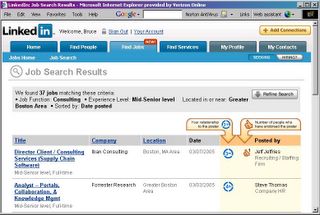
This is a pretty cool setup. Next to each job that matches my search criteria, LinkedIn shows me who posted the job and how many degrees I am removed from that person. If I investigate a particular job title, with one more click I can see all the hiring managers in my network at that company.
As cool as that is, I was even more excited to see a position on the board that actually interested me. (I am actively looking for new professional opportunities.) So with more than academic interest, I put LinkedIn through its paces, with an eye to reporting my findings here.
What did I find? Linked in is helpful, but mostly when I don't really need its help after all. My first attempt to connect via LinkedIn met with a polite rejection. Then with a little more detective work I found a better connection, not a hiring manager but only two degrees away. As I entered my LinkedIn connection request, I got the feeling I was making things too complicated, and sure enough my friend chose to introduce me to my target via regular email rather than through LinkedIn.
Rather than get frustrated at my inability to exploit LinkedIn to the fullest, I gave this situation some thought and realized it all makes perfect sense. To illustrate what I mean, I will borrow an example from a very nice SNA primer written by James Millar (formerly of Bonfire Consulting, now of Tapestry Networks). Consider the classic networking scenario. Alice wants an introduction to Bruce, but she doesn't know Bruce. Then one day Alice discovers that her friend Cindy does know Bruce:
Seeing how introducing Alice to Bruce will make both her friends happy, Cindy obliges. This is how networking has worked for millenia, with or without LinkedIn.
Now consider taking this scenario one step further. Suppose Alice again wants an introduction to Bruce, but this time Alice's friend Cindy doesn't know Bruce. Instead, Cindy knows David, who knows Bruce:
In this scenario, neither Cindy nor David can fully share the joy of introducing Alice and Bruce, and so the networking will probably stall (if it even gets started).
Considering these two scenarios, you can begin to see the perversity of LinkedIn. In the first scenario, Alice may need LinkedIn to discover her connection to Bruce, but after that she has no need of LinkedIn's elaborate request-forwarding service. She can just ask Cindy to introduce her directly.
In the second scenario, however, Alice may not even know of David's existence, and Cindy may be unaware that David knows Bruce. How will Alice ever know to ask Cindy to approach David? Only with a power-assisted request from LinkedIn. So LinkedIn really can help -- in precisely the scenario when the intermediaries have almost nothing to gain by cooperating.




1 comment:
Bruce - interesting insights. Let me add a couple more from my use of LinkedIn.
I have a bunch of friends and colleagues who are at great geographic distance to me, so it's handy to have a way to keep track of them for my quarterly or annual times that we connect with each other. People change jobs frequently enough that it's nice to have some clue where they are.
A lot of people have put useful keywords into LinkedIn, so much so that I sometimes find it a better first search than Google when looking for someone by name. If you don't know someone but can find that they have 50 links in LinkedIn and are 2 or 3 hops from you it's easier to figure out how to send them something than perhaps just a call direct.
I'm part of an organization setting up an alumni group on LinkedIn (for former employees of Cisco). It's been very helpful in that effort so far.
we're still early in this game to know just what the value of having a million or ten million interlinked resumes online. I'm betting the collective value is big enough that someone can monetize a piece of it to keep the system running.
Post a Comment